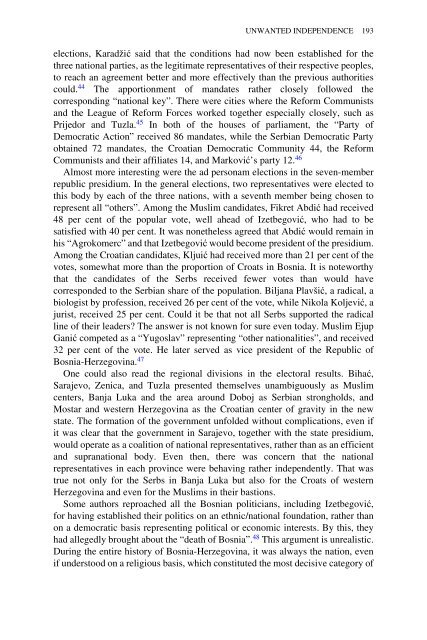Yugoslavia: A History of its Demise - Indymedia
Yugoslavia: A History of its Demise - Indymedia
Yugoslavia: A History of its Demise - Indymedia
Create successful ePaper yourself
Turn your PDF publications into a flip-book with our unique Google optimized e-Paper software.
UNWANTED INDEPENDENCE 193<br />
elections, Karadžić said that the conditions had now been established for the<br />
three national parties, as the legitimate representatives <strong>of</strong> their respective peoples,<br />
to reach an agreement better and more effectively than the previous authorities<br />
could. 44 The apportionment <strong>of</strong> mandates rather closely followed the<br />
corresponding “national key”. There were cities where the Reform Communists<br />
and the League <strong>of</strong> Reform Forces worked together especially closely, such as<br />
Prijedor and Tuzla. 45 In both <strong>of</strong> the houses <strong>of</strong> parliament, the “Party <strong>of</strong><br />
Democratic Action” received 86 mandates, while the Serbian Democratic Party<br />
obtained 72 mandates, the Croatian Democratic Community 44, the Reform<br />
Communists and their affiliates 14, and Marković’s party 12. 46<br />
Almost more interesting were the ad personam elections in the seven-member<br />
republic presidium. In the general elections, two representatives were elected to<br />
this body by each <strong>of</strong> the three nations, with a seventh member being chosen to<br />
represent all “others”. Among the Muslim candidates, Fikret Abdić had received<br />
48 per cent <strong>of</strong> the popular vote, well ahead <strong>of</strong> Izetbegović, who had to be<br />
satisfied with 40 per cent. It was nonetheless agreed that Abdić would remain in<br />
his “Agrokomerc” and that Izetbegović would become president <strong>of</strong> the presidium.<br />
Among the Croatian candidates, Kljuić had received more than 21 per cent <strong>of</strong> the<br />
votes, somewhat more than the proportion <strong>of</strong> Croats in Bosnia. It is noteworthy<br />
that the candidates <strong>of</strong> the Serbs received fewer votes than would have<br />
corresponded to the Serbian share <strong>of</strong> the population. Biljana Plavšić, a radical, a<br />
biologist by pr<strong>of</strong>ession, received 26 per cent <strong>of</strong> the vote, while Nikola Koljević, a<br />
jurist, received 25 per cent. Could it be that not all Serbs supported the radical<br />
line <strong>of</strong> their leaders The answer is not known for sure even today. Muslim Ejup<br />
Ganić competed as a “Yugoslav” representing “other nationalities”, and received<br />
32 per cent <strong>of</strong> the vote. He later served as vice president <strong>of</strong> the Republic <strong>of</strong><br />
Bosnia-Herzegovina. 47<br />
One could also read the regional divisions in the electoral results. Bihać,<br />
Sarajevo, Zenica, and Tuzla presented themselves unambiguously as Muslim<br />
centers, Banja Luka and the area around Doboj as Serbian strongholds, and<br />
Mostar and western Herzegovina as the Croatian center <strong>of</strong> gravity in the new<br />
state. The formation <strong>of</strong> the government unfolded without complications, even if<br />
it was clear that the government in Sarajevo, together with the state presidium,<br />
would operate as a coalition <strong>of</strong> national representatives, rather than as an efficient<br />
and supranational body. Even then, there was concern that the national<br />
representatives in each province were behaving rather independently. That was<br />
true not only for the Serbs in Banja Luka but also for the Croats <strong>of</strong> western<br />
Herzegovina and even for the Muslims in their bastions.<br />
Some authors reproached all the Bosnian politicians, including Izetbegović,<br />
for having established their politics on an ethnic/national foundation, rather than<br />
on a democratic basis representing political or economic interests. By this, they<br />
had allegedly brought about the “death <strong>of</strong> Bosnia”. 48 This argument is unrealistic.<br />
During the entire history <strong>of</strong> Bosnia-Herzegovina, it was always the nation, even<br />
if understood on a religious basis, which constituted the most decisive category <strong>of</strong>
















